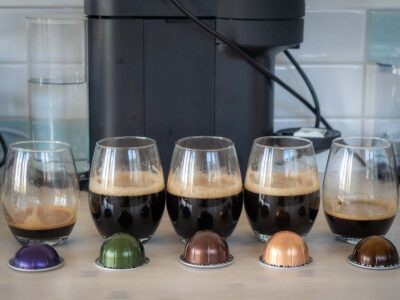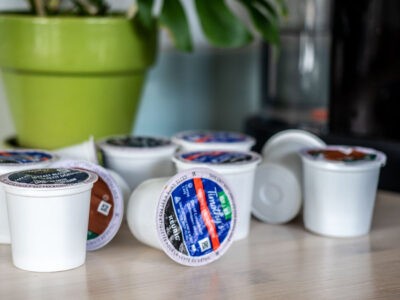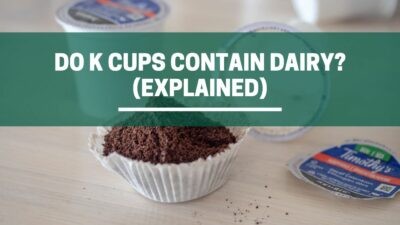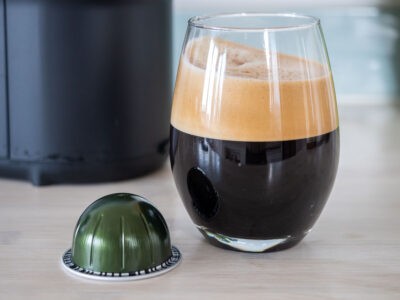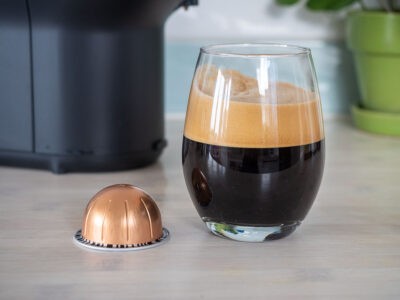Nespresso Guides
Can you drink Nespresso during pregnancy?
Drinking Nespresso during pregnancy (or any coffee for that matter) does not pose a serious health risk, but it is strongly recommended that it be avoided as research shows a number of negative imacts to the health of your baby.
Just as caffeine can affect adults, it can also affect the unborn baby. This means that if you drink Nespresso or another drink that contains caffeine, it can cause heart acceleration, a blood pressure rise, and an accelerated metabolism. Some other effect of caffeine are as follows:
- Difficulties falling asleep and resting.
- Nervousness.
- Heartburn.
- Elevation of blood pressure.
- Acceleration of the heart rate.
- Increased tension.
- Difficulty absorbing iron (due to the phenols present in coffee).
The primary reason why it is not recommended to drink Nespresso during pregnancy is that the baby’s body is not yet formed, making it more difficult for them to metabolize the caffeine that he has absorbed. This means that the baby will be exposed to caffeine for much longer than the mother.
There’s also studies that correlate caffeine consumption with a smaller birth size.
Finally, caffeine is a diuretic which increases the frequency and volume of urination. This causes a reduction in your body’s fluid levels and can lead to dehydration for you and your baby.
Why Listen To Us? Well, because we KNOW coffee! In fact, we make our own coffee, coffee machine cleaners, and reusable capsules which we've sold to over 41 countries. Our team ouf experts include Tristan (an engineer), Claire (a food writer) and Richy (a barista). So, whether you're looking for a recipe or repair guide, we've got you covered 💚
Table of Contents
Caffeine crosses the placenta to your baby.
Although you may be able to handle a couple of coffees, your baby cannot. Your baby’s metabolism is still maturing and cannot fully metabolize the caffeine.
Your baby is also much smaller than you, so a small dose of caffeine for you is in fact a very large dose for the baby. Based on body weight the dose could be 20x what you experience.
Any amount of caffeine can also cause changes in your baby’s sleep pattern or normal movement pattern in the later stages of pregnancy. Remember, caffeine is a stimulant and can keep both you and your baby awake.
How Much Caffeine Should You Drink During Pregnancy?
While the jury is still out on the exact effects of various levels of caffeine intake, the scientific consensus is to limit your intake to less that 200mg per day.
This is roughly equivalent to one cup large cup of filter coffee or two small espresso style coffees.
The World Health Organization is a little less strict and provides a recommended limit of 300 milligrams per day.
However, it is advised that it is better to avoid taking it, that is, not to take any caffeine at all.
How much caffeine is in Nespresso?
Each Nespresso espresso capsule can contain anywhere between approximately 55 and 142 milligrams of caffeine, with an average of around 75mg.
The lungo capsules generally have 20% more coffee content for each of the capsules, which means that the caffeine content is slightly higher, its caffeine content is between 77 and 89 milligrams.
These amounts vary depending on the green coffee mainly (Robusta vs Arabica), the level of roasting of the coffee, and, to a lesser extent, the origin of the coffee.
Nespresso decaffeinated blends are guaranteed to contain less than 2mg and in reality have approximately 0.005 milligrams of caffeine per serving. \
There is no correlation whatsoever between caffeine content and assigned “intensity”.
To check the caffeine content of your favourite brew, have a read of our full write up here.
Coffee in the first month of pregnancy
Researchers at the University of Pelotas looked at the children of nearly 900 women who consumed caffeine in pregnancy. They found caffeine consumption during pregnancy did not affect their baby’s sleep during the first three months.
For this reason, drinking coffee responsibly during pregnancy during the first trimester is less harmful and the risks are much lower.
We still recommend limiting yourself to 200mg or less once you know you are pregnant.
Coffee in the third trimester of pregnancy
The body of women during pregnancy as the due date approaches, their body adapts for the birth of the baby and these changes cause caffeine to take longer to metabolize.
Caffeine is normally expelled from the body within 4 to 6 hours in the urine. However, it takes twice as long for caffeine to leave the body during the second trimester.
And even more so in the third trimester of pregnancy, since caffeine can take up to three times as long to metabolize, around 18 hours.
Caffeine is believed to cause blood vessels in the uterus and placenta to constrict, which could reduce the blood supply to the fetus and inhibit growth
That is why it is much better to drink coffee in early pregnancy than in the third trimester.
Can you drink Nespresso while breastfeeding?
It is recommended that the amount of caffeine that you consume be reduced as much as possible or eliminated when the baby is breastfeeding.
This is advised for the same reason that taking Nespresso should be avoided during pregnancy when the baby is feeding on the placenta; Because the ingested caffeine will end up inside your baby’s body.
A small dose of caffeine for you is a much larger dose for a baby.
If you can’t resist a cuppa, it’s important to understand the half-life of caffeine is 4-6 hours. This means the potency of caffeine in your body is halved after 4 hours, and halved again after 8.
For this reason, it’s sensible to time your breast feeding and to wait as long as possible before feeding again.
Conclusion
In conclusion, its best to avoid caffeine such as Nespresso and other coffees, but also chocolate, tea and some soft drinks during pregnancy and when breast feeding.
The current research suggests if you do drink coffee, limit it to less than 200mg per day. If breast feeding, time this so as to maximize the time until your next feeding.
Nespresso have a range of decaf or decaffeinato capsules which have less than 2mg of caffeine and are perfect if you are craving a Nespresso.
We recommend that you always consult with your doctor about what is best for you and your baby.


